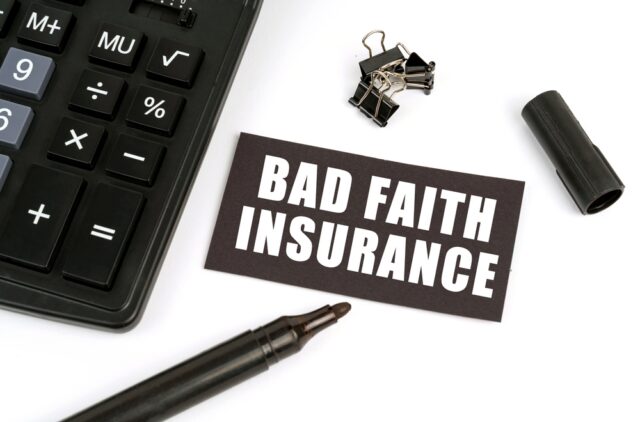No matter the type or where they occur, car accidents are often unexpected traumatic events. In their wake, individuals are left with severe physical injuries, emotional scars, and financial burdens.
It’s no wonder that many accident victims are left wondering: Can I sue after a car accident? The answer is not always simple, but a lawyer can explain your legal rights, the types of damages you may deserve, and when a lawsuit is appropriate.
Contact an experienced car accident lawyer to recover the compensation you deserve.
Table Of Content
- Understanding the Legal Basis for Suing After a Car Accident
- What Is Negligence?
- When Can You Sue After a Car Accident?
- Understanding the Statute of Limitations for Filing a Car Accident Lawsuit
- Compensation You Can Pursue in a Car Accident Lawsuit
- The Importance of Contacting a Reputable Car Accident Lawyer
- Injured in a Car Accident? Take Action Today by Seeking Legal Representation
What Is a Car Accident Lawsuit?
A car accident lawsuit is a legal action taken by an individual who has suffered an injury or damage in a car accident. It typically involves filing a claim against the person or entity whose negligence caused the accident.
The goal of a lawsuit is to seek compensation for the victim’s injuries, medical bills, lost earnings, property damage, pain and suffering, and other associated costs.
Individuals can often seek compensation through their insurance policies or the other party’s insurance coverage. However, you may need to file a lawsuit if insurance doesn’t fully cover the damages or if liability is disputed.
Understanding the Legal Basis for Suing After a Car Accident
The ability to sue after a car accident generally arises from personal injury law and negligence principles. To pursue a lawsuit, you must prove the other party’s negligence and that their negligence caused the accident and your injuries.
What Is Negligence?
Negligence refers to the failure to take reasonable care, which leads to an accident and causes harm.
To successfully sue someone for a car accident, you or your car accident attorney must establish:
- Duty of Care: The defendant (the person you are suing) had a legal obligation to drive safely and follow traffic laws. All drivers on the road owe this duty to others.
- Breach of Duty: The defendant failed to meet this duty of care. For example, they may have been speeding, texting while driving, running a red light, or driving under the influence of alcohol or drugs.
- Causation: The defendant’s actions directly caused the accident. You need to prove that the breach of duty was the proximate cause of the accident and your injuries.
- Damages: You must show that you suffered actual harm or losses due to the accident—physical injuries, property damage, emotional distress, or financial loss.
When Can You Sue After a Car Accident?
While not every car accident leads to a lawsuit, certain circumstances make filing a lawsuit the best option. Here are several situations where you might want to pursue legal action:
Severe or Permanent Injuries
When a car accident results in catastrophic injuries that require long-term medical treatment or rehabilitation, the damages may exceed the insurance coverage available. In cases like this, you may need to file a lawsuit to recover the full extent of your losses.
Some examples of severe injuries include:
- Spinal cord injuries (SCI) resulting in paralysis or limited mobility.
- Traumatic brain injuries (TBI) can cause lifelong cognitive impairments.
- Amputations or severe fractures requiring extensive surgeries and rehabilitation.
In these cases, the medical bills lost earnings, and pain and suffering may exceed the insurance coverage limits, necessitating a lawsuit to pursue additional compensation.
Wrongful Death Claims
If a loved one dies due to a car accident caused by another driver’s negligence, the surviving family members may file a wrongful death lawsuit.
This type of lawsuit allows family members to seek compensation for:
- Funeral and burial expenses.
- Loss of income that the deceased would have provided.
- Loss of companionship and emotional distress caused by the loss.
The case’s value depends on the deceased’s age, earning potential, and the emotional impact on the surviving family members.
Disputed Liability
Sometimes, the at-fault driver or their insurance company denies responsibility for the accident. In such cases, pursuing a lawsuit may be necessary to prove fault.
Common examples of disputed liability include:
- Conflicting witness statements about what happened during the accident.
- Discrepancies between police reports and the parties’ accounts of the incident.
- The at-fault driver’s failure to admit negligence or the insurance company’s refusal to settle the claim fairly.
In these situations, having strong evidence, such as police reports, accident reconstruction experts, and eyewitness testimony, can help establish fault.
Insurance Bad Faith
 Insurance companies must act in good faith and provide a fair settlement for valid claims. However, sometimes insurance companies deny valid claims, offer unreasonably low settlements, or delay payments in bad faith. If you believe your insurance company is not honoring its obligations, you may need to file a lawsuit against the insurer.
Insurance companies must act in good faith and provide a fair settlement for valid claims. However, sometimes insurance companies deny valid claims, offer unreasonably low settlements, or delay payments in bad faith. If you believe your insurance company is not honoring its obligations, you may need to file a lawsuit against the insurer.
Common examples of insurance bad faith include:
- Denying coverage without a valid reason.
- Offering an amount far below the actual value of your claim.
- Delaying payment or failing to respond to your claim.
A lawyer can help take legal action against the insurance company in such cases.
Insufficient or No Insurance Coverage
If the at-fault driver does not have insurance or insufficient coverage to pay for the damages, suing the driver directly may be your only option for recovering the compensation.
In some states, drivers must carry uninsured motorist or underinsured motorist coverage. Your policy covers this, you can pursue compensation through your insurance company. However, you may need to sue the at-fault driver.
Understanding the Statute of Limitations for Filing a Car Accident Lawsuit
The statute of limitations is critical in determining whether you can file a car accident lawsuit. This legal deadline sets the maximum amount of time you have to initiate a lawsuit after an accident.
Failing to file within this timeframe typically results in losing your right to pursue compensation, regardless of the severity of your injuries or the strength of your case.
Why the Statute of Limitations Exists
The statute of limitations:
- Encourages Prompt Action: It resolves legal disputes promptly while evidence and witness testimony are still fresh.
- Protects Defendants: It prevents individuals from facing legal action long after the event, when records or memories may have faded.
- Promotes Legal Finality: It provides a clear timeframe to pursue legal claims, helping to maintain the court system’s efficiency.
General Timeframes
While the specific timeframe varies by jurisdiction, the statute of limitations for car accident lawsuits is commonly between one and four years. This period usually begins on the accident date, although exceptions may apply.
Exceptions to the Statute of Limitations
Certain circumstances may extend or toll (pause) the statute of limitations, including:
- Discovery Rule: If an injury does not immediately manifest, the statute of limitations may begin when the injury is discovered or reasonably should have been discovered.
- Minors: If the victim is under 18 years old, the clock may not start until they reach the age of majority.
- Incapacity: If the accident incapacitated the victim, the statute of limitations may toll until they regain capacity.
- Fraud or Misrepresentation: If the at-fault party’s actions delayed the filing of a claim, the statute may increase.
Why Timeliness Matters
Even if exceptions might apply, acting promptly after a car accident is imperative. Delays can result in lost evidence, uncooperative witnesses, or other challenges that weaken your case. A knowledgeable car accident attorney will meet the deadline and build a strong compensation case.
Compensation You Can Pursue in a Car Accident Lawsuit
If you win a car accident lawsuit or reach a settlement, you may recover compensation.
Economic Damages
 Economic damages compensate for measurable, tangible financial losses that you incurred due to the accident.
Economic damages compensate for measurable, tangible financial losses that you incurred due to the accident.
These include:
- Medical Expenses: This includes emergency room visits, surgeries, hospital stays, rehabilitation, and ongoing treatment for your injuries.
- Lost Earnings: If your injuries prevent you from working, you can seek compensation for your lost earnings during recovery. It can also include future lost earnings if your injuries affect your ability to work long-term.
- Property Damage: This includes the cost of repairing or replacing your vehicle or other personal property the accident damaged.
- Loss of Earning Capacity: If your injuries result in long-term disability that prevents you from returning to your job or working at full capacity, you may recover compensation for the reduced earning potential.
Non-Economic Damages
Non-economic damages compensate for intangible losses:
- Pain and Suffering: The physical and emotional distress caused by the accident and your injuries. It includes both past and future suffering.
- Loss of Enjoyment of Life: If your injuries prevent you from engaging in activities you previously enjoyed, such as sports, hobbies, or spending time with family, you may recover compensation for the loss of enjoyment of life.
- Emotional Distress: This includes anxiety, depression, post-traumatic stress disorder (PTSD), and other emotional effects resulting from the accident.
Punitive Damages
In some cases, the court may award punitive damages if the defendant’s actions were particularly reckless or egregious (such as drunk driving). These damages punish the defendant for their actions and deter others from engaging in similar behavior.
The Importance of Contacting a Reputable Car Accident Lawyer
A skilled car accident lawyer can protect your legal rights. Lawyers who are well-versed in personal injury law can help manage the details of filing a lawsuit and ensure you receive the compensation you deserve.
Why should you contact a lawyer after a car accident?
- Professional Legal Advice: Car accident attorneys know the laws governing accidents and personal injury claims. They can assess the strength of your case and provide valuable advice on the best course of action.
- Investigation and Evidence Gathering: A lawyer will gather key evidence, such as police reports, medical records, and witness statements, essential for proving liability and damages in your case.
- Negotiation Skills: Insurance companies often try to settle claims quickly with lowball offers. A lawyer can negotiate with the insurer to ensure you recover a fair settlement covering all your damages.
- Trial Representation: If your case goes to trial, an experienced lawyer will represent you in court, present your case to the judge or jury, and fight for your right to compensation.
- Contingency Fee Structure: Most car accident lawyers work on a contingency fee basis, meaning you don’t pay any upfront fees. The lawyer only gets paid if you win your case.
Injured in a Car Accident? Take Action Today by Seeking Legal Representation
After a car accident, a qualified car accident lawyer can guide you through the legal process and protect your rights. They can also help recover the maximum compensation for your injuries, lost earnings, pain and suffering, and other damages.
In addition to negotiating with insurance companies, a car accident lawyer can help gather crucial evidence to support your claim. They will thoroughly investigate the accident scene, gather witness statements, obtain police reports, and consult medical experts to determine the full extent of your injuries. This comprehensive approach is necessary in building a strong case.
Don’t delay in seeking legal representation. The sooner you contact a car accident lawyer, the sooner you can begin building your case and securing the compensation you deserve. Contact a personal injury lawyer today for your free consultation and take control of your future.

